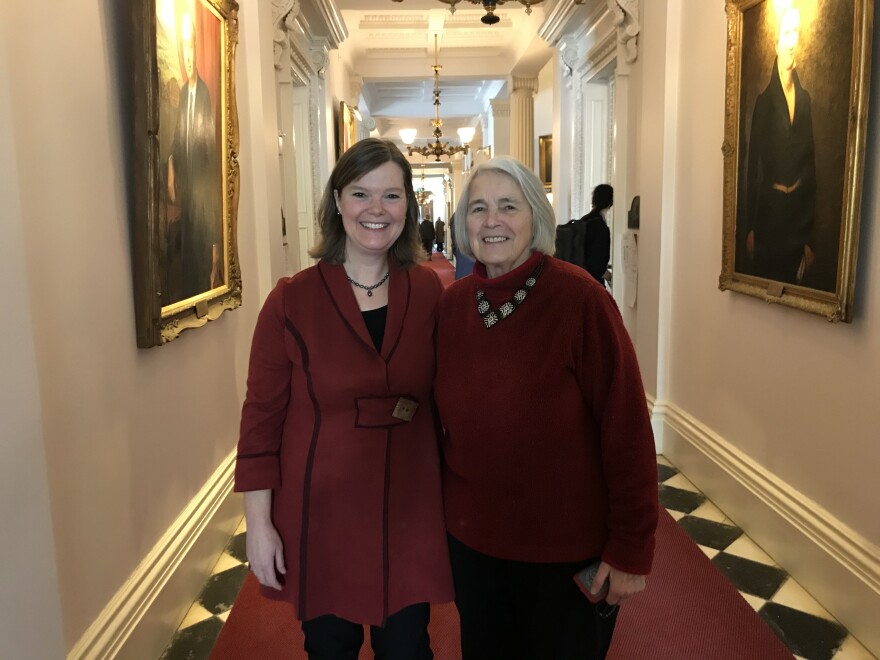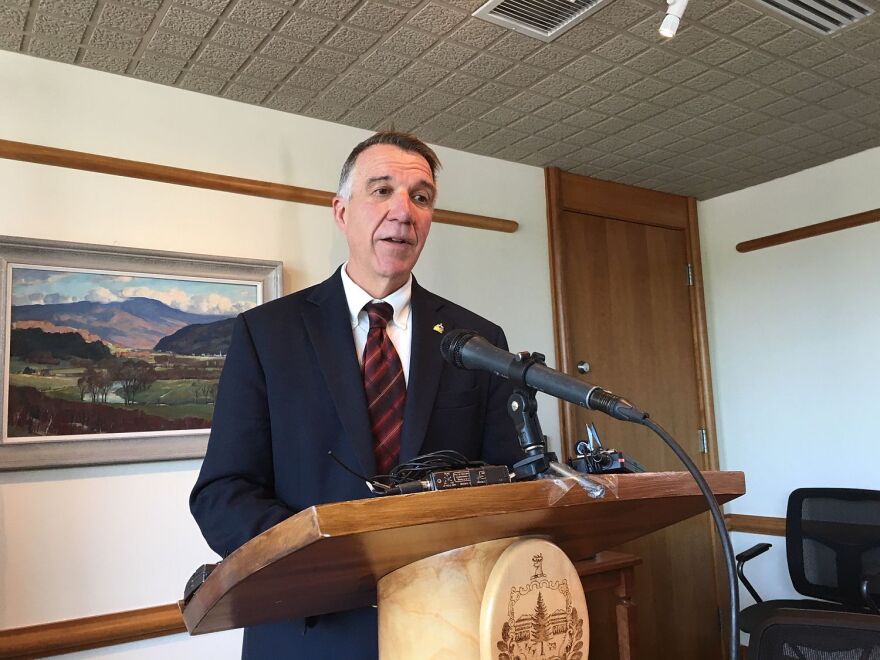Vermont lawmakers made quick work of their veto session earlier this week. In just one day they managed to override five of the seven vetoes that Gov. Phil Scott issued over the past month, and they extended emergency motel housing for about 1,200 low-income households until at least next April.
Vermont Public’s Mary Engisch spoke with reporter Peter Hirschfeld to learn more about the bills that legislators have enacted into law, and what this veto session tells us about the balance of power in Montpelier. Their conversation below has been edited and condensed for clarity.
Mary Engisch: We saw some big override votes this week. What have legislators enacted into law? And what does it tell us about their ability to sort of bypass the executive branch?
Peter Hirschfeld: Lawmakers overrode five vetoes, Mary, and those overrides included two really massive pieces of legislation. One was the $8.5 billion budget that Phil Scott has characterized as a fiscally irresponsible spending plan that grows state spending by 13% next year, and relies on tax and fee increases on Vermonters to do it. The other major bill was a child care bill that uses a new payroll to increase public funding for the state’s child care system by about $120 million a year.
Other veto overrides included a professional regulation bill that increases license fees at the secretary of state’s office. And two local charter changes — one in Brattleboro that will allow 16- and 17-year-olds to vote in local elections, and one in Burlington that give non-U.S. citizens voting rights in local elections.

Lawmakers approved another significant bill that was not tied to any of these override votes, and that legislation will extend an emergency motel housing program for about 1,200 low-income households until at least next April.
I think what happened on Tuesday speaks to the power right now of the Democratically-controlled Legislature to sort of chart its own policy course, regardless of the fact that there’s a fiscally conservative governor overseeing the executive branch. And they’re doing that in ways that can often reflect contempt for Phil Scott’s approach to governance. I was struck by Addison County Sen. Ruth Hardy’s remarks at an enactment ceremony for the child care bill on the Statehouse lawn on Wednesday.
“I’m mostly just excited for this day finally being here, and to have these kids here to sign the bill, something that the governor did not have a maturity or the courage to do,” Hardy said.
The photo op at this event was all these kids signing an oversized printout of the child care bill, and that’s why Hardy was referencing the kids there. But as you can hear, lawmakers aren’t just overriding the governor. They’re calling into question his ideological fitness for the role.
Two of Phil Scott’s vetoes did stick this week. One bill dealt with police interrogations of juveniles. The other would have raised lawmakers’ pay. Why wasn’t the Legislature able to override those vetoes?
Simply put, they didn’t have the votes. That police interrogation bill you mentioned would have prohibited from police from using deceit or coercion in custodial interrogations with any alleged offender under the age of 23. The governor’s office, as well as the attorney general, recently raised some concerns with that bill, and said it could complicate investigations into sexual assaults on college campuses. And so there were a number of lawmakers who voted yes on that legislation during the session, but decided it would make more sense to vet those concerns out before taking this decisive action.
As for legislative pay, I think the governor had some productive conversations, shall we say, with some members of the Senate. And the chamber lost a couple votes that it otherwise needed to get the two-thirds majority for an override.

I’ll note, Mary, that a lot of Vermont lawmakers think the shelving of that legislative pay bill — which would have increased legislative pay to the average Vermont wage — is going to have serious ramifications long term.
Chittenden County Sen. Tanya Vyhovsky articulated those concerns pretty succinctly on the Senate floor on Tuesday.
“The barriers to service in the General Assembly are astronomical. And for most average Vermonters, they’re actually insurmountable, which is why the demographics of the General Assembly do not match the demographics of Vermont. And this is a problem. This is one of the reasons we have such a difficult time meeting the needs of average Vermonters,” Vyhovsky said.

Vyhovsky works seven days a week to supplement the $800 a week she makes as a lawmaker. There are other lawmakers working long hours outside of their legislative duties. And there’s a real fear that some of the fresher faces in the Legislature just aren’t going to last long given the economic sacrifices that younger lawmakers, especially, have to make in order to serve in those positions.
Until Phil Scott came along, a single governor had never had their vetoes overridden by the Legislature more than twice. Why are Democrats having so much success overriding Scott? And what does it tell us about the balance of power in Montpelier?
Yeah, that governor was Jim Douglas. And before him, no governor had actually had more than one veto overridden, so Phil Scott’s tenure has taken us into uncharted waters really as far as veto overrides go.

We theoretically have divided government in Vermont. Democrats control the legislative branch. And a Republican oversees the executive. Until this year, that dynamic has served to moderate the policies we see coming out of Montpelier. Lawmakers often have to negotiate with the governor, dial back a little bit, or a lot in some cases, in order to get a legislative initiative into law. But after the last election cycle, Democrats have a wider majority in the House and Senate than at any other time in the history of the state. And even Phil Scott now says that his ability to ensure ideological balance and fiscal moderation is waning.
“But it’s getting more difficult. This has been one of the more difficult years, particularly with less engagement with the Legislature. We were just a bit of a speed bump along the way to their passing whatever they wanted to pass,” Scott said.
When Democrats were working on their child care bill, Phil Scott wasn’t in the picture. They knew he wouldn’t support a payroll tax or income tax to fund the new spending. But instead of trying to bring him on board, they simply went the path that would ensure the votes they needed to override an inevitable veto. We’re seeing that strategy play out more and more in Montpelier. And it raises some questions about the extent to which Phil Scott will be able to influence the broader policy direction the state is headed in.
Have questions, comments or tips? Send us a message or get in touch with reporter Peter Hirschfeld:






